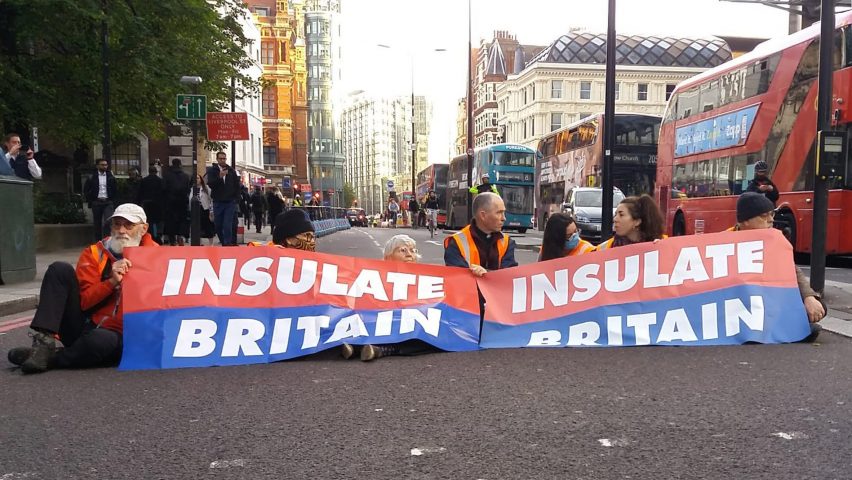
"Act up, disrupt and get noisy"
Environmental protest group Insulate Britain has caused controversy by blocking roads to highlight the need for better insulation in homes. But its aims are correct and direct action is "pretty much the only effective democratic way" to achieve change, argues architect Duncan Baker-Brown.
What does it take to affect societal change? This is what is required to meet the challenges of this climate and ecological emergency. History tells us that non-violent direct action is pretty much the only effective democratic way.
Whether one considers the suffragettes from the turn of the 20th century or freedom riders who deliberately drove interstate buses into segregated southern United States in the early 1960s, non-violent direct action can effect change. To put it another way, it can speed up the evolution of thoughts into deeds in a matter of years instead of decades or even centuries.
It would appear that humankind is on the verge of admitting that we can't organise ourselves to help ourselves
Quite clearly, nobody who reads the scientific facts about our burning planet or the current mass extinction of species can feel complacent about the future.

Perhaps you only started to read the scary headlines now, such as those in the recent IPCC climate report? Or perhaps, like me, you feel that COP26 is currently looking more like OPEC '73 as world leaders from China, India, Australia etcetera make it clear that they intend to stick with fossil fuels for the time being?
It would appear that humankind is on the verge of admitting that we can't organise ourselves to help ourselves! Perhaps Greta Thunberg is correct when she says "We need public pressure, not just summits. Change will only come when people demand change."
Our housing stock must be adequately retrofitted to meet our net-zero carbon targets
I'm not sure how scary it has to get, how much of the world's forests have to be burned (one in eight hectares of California's once-vast forests have burned in the last 10 years) or how many people have to die before the majority of us from change from being passive observers to pro-active campaigners.
I guess it's the passive observer in all of us that finds Insulate Britain's current direct-action protests such an inconvenient pain in the neck? What are they thinking, especially straight after three Covid-19 lockdowns? Well, beyond the short-term inconvenience, I believe it all makes complete sense.
I have publicly supported the Insulate Britain campaign, although I think some of their direct action protests are misguided. I'd focus on the procurers of fossil fuels and the members of parliament who support them, rather than commuters.
However, they are well-informed and quite rightly insisting that our housing stock must be adequately retrofitted to meet our net-zero carbon targets, that it should be coordinated by central government and rolled out systematically and by all accounts very quickly.
Most impressively, they have pretty single-handedly raised the profile of this normally rather esoteric of topics.
Insulate Britain understands the bleeding obvious, or what is obvious to anybody who understands that one of the most straightforward ways to meet our commitment to being net-zero carbon by 2050 is to upgrade the performance of our existing built environment, 80 per cent of which will still be around in 2050 trying to meet said ambitious targets.
Low carbon retrofit doesn't come cheap, but it does have a number of huge benefits
Insulate Britain is taking the scientists (including numerous IPCC reports) at their word and demanding that we retrofit all 29 million UK homes within eight years in order to have half a chance of sticking to the 1.5 degree Celsius temperature-rise commitment made by most nations in the 2015 Paris Agreement.
Insulate Britain's demands also acknowledge that the cost of this nationwide infrastructure project cannot be met by UK citizens alone. At anything from £18,000 to £35,000 per dwelling, or around £580 billion in total, low carbon retrofitting doesn't come cheap, but it does have a number of huge benefits.
"Normal" infrastructure projects such as the HS2 train line (costing £100 billion and counting) have limited benefits to specific trades and specific regions of the UK. HS2's benefits to commuters are also debatable unless you happen to travel between London and Birmingham and need to shave an extra 20 minutes off your journey time.
HS2 also comes with some very negative side-effects and bad PR, not least the destruction of over 100 ecologically sensitive sites in what is already Europe's most ecologically depleted country.
This mass retrofit project will train and employ tens of thousands of people across the whole of the UK
On the other hand, the mass retrofitting of the national housing stock has lots of universal benefits that even work from the point of view of Boris Johnson's own levelling-up agenda.
If conceived more as a national infrastructure project managed by its own government ministry, this mass retrofit project will train and employ tens of thousands of people across the whole of the UK, not just the south.
It will also create climate-resilient, low carbon, comfortable homes for the masses and help us meet our net-zero targets whilst supporting green, clean technologies.
So I ask you all – what's not to like? How else do you raise awareness of our current government's seismically slow response to the existential problem that is the climate and ecological emergency?
I say act up, disrupt and get noisy. Ask yourself, what is stopping you from doing something today? If you work in the built environment sector, you can easily have a far greater impact at work than at home.
For example, I heard recently that if you were to specify a 10-metre x 10-metre concrete slab that is 50 millimetres thinner than normal, that will save more CO2 than giving up eating meat for the whole year.
We are in a hugely impactful industry that actually has the collective knowledge to know what to do
In addition, it is increasingly understood by many people that humankind simply won't get anywhere near a net-zero carbon lifestyle unless we deal with the built environment that is responsible for about 45 per cent of all CO2 emissions worldwide, whilst consuming 50 million tonnes of raw materials harvested and mined annually.
In the UK, this creates 60 per cent of our waste (that's 120 million tonnes of stuff going to landfill and incineration).
Designing, constructing, occupying, maintaining and demolishing the world's built environment is responsible for half the negative impact humans have on our host planet.
We are in a hugely impactful industry that actually has the collective knowledge to know what to do. Just think of the impact that the recent LETI Climate Emergency Design Guide has had.
It, and other publications from RIBA, Architects Declare, UKGBC and more, have completely changed the critical debate and understanding within our sector in less than a two-year period. Now it's time to act on these words. Perhaps that includes direct action.
The main image is by Insulate Britain.
Duncan Baker-Brown is a practising architect, academic and environmental activist. Author of The Re-Use Atlas published by RIBA and Climate Literacy Champion at the University of Brighton, he has practised, researched, and taught around issues of sustainable and closed-looped systems for more than 25 years.